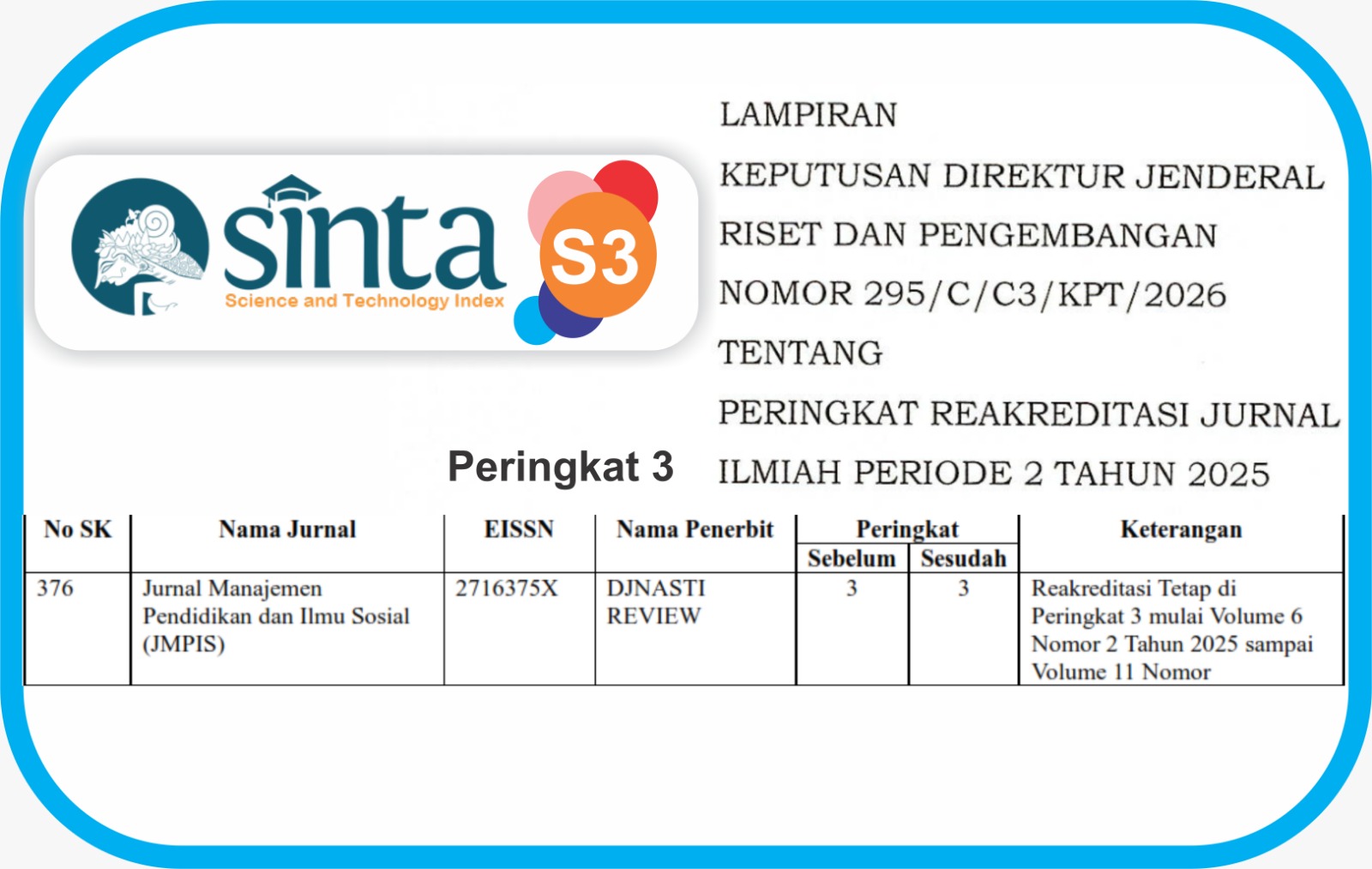Kinerja Adaptif ditinjau dari Kepribadian dan Kepuasan Kerja
DOI:
https://doi.org/10.38035/jmpis.v6i2.4335Keywords:
Kinerja Adaptif, Budaya Organisasi, Kepribadian, Kepuasan KerjaAbstract
Kinerja adaptif guru merupakan perilaku guru dalam mengantisipasi dan beradaptasi terhadap segala bentuk perubahan situasi kerja yang dinamis, baik perubahan tujuan organisasi, perubahan tugas, maupun perubahan lingkungan kerja. Penelitian ini merupakan penelitian kuantitatif dengan metode survey dan menggunakan pendekatan analisis jalur (path analysis). Tujuan dari penelitian ini untuk menentukan apakah terdapat pengaruh langsung maupun tidak langsung kepribadian dan kepuasan kerja terhadap kinerja adaptif guru. Populasi dalam penelitian ini adalah seluruh guru PNS SMA Negeri terakreditasi A di wilayah barat Kabupaten Bogor. Jumlah sampel diperoleh 122 orang guru dihitung menggunakan rumus Slovin, penentuan sampel menggunakan teknik proportional random sampling. Hasil penelitian menunjukkan bahwa terdapat pengaruh positif langsung kepribadian terhadap kinerja adaptif dengan nilai ?=0.497; terdapat pengaruh positif langsung kepuasan kerja terhadap kinerja adaptif dengan nilai ?=0.332; terdapat pengaruh positif langsung kepribadian terhadap kepuasan kerja dengan nilai ?=0.613; dan terdapat pengaruh positif tidak langsung kepribadian terhadap kinerja adaptif melalui kepuasan kerja dengan nilai pengaruh sebesar 0.204. Hasil penelitian menunjukkan bahwa kinerja adaptif dapat ditingkatkan melalui kepribadian dan kepuasan kerja.
References
Abd Kadir, M. F. (2019). Task Performance and Adaptive Performance Among Logistician: A Conceptual Perspective on the Individual Factors and the Situational Factors. International Journal of Business and Management, 3(3), 16–25. https://doi.org/10.26666/rmp.ijbm.2019.3.3
Alavi, S., & Wahab, D. A. (2013). A review on workforce agility. Research Journal of Applied Sciences, Engineering and Technology, 5(16), 4195–4199. https://doi.org/10.19026/rjaset.5.4647
Andora, E. D. (2020). Pentingnya Kepuasan Kerja Karyawan Dalam Organisasi Pentingnya Kepuasan Kerja Karyawan Dalam Organisasi Pentingnya Kepuasan Kerja Karyawan Dalam Organisasi. file:///C:/Users/Asus/Downloads/ARTIKEL DONA.pdf
Aziri, B. (2011). Job satisfaction?: A Literature Review. Management Research and Practice, 3(4), 77–86. https://doi.org/10.1254/jjp.31.1037
Bednall, T. C., & Henricks, M. D. (2021). Adaptive Performance. 71–89. https://doi.org/10.4018/978-1-7998-6948-1.ch005
Bornstein, M. H. (2018). Big Five Personality Traits. The SAGE Encyclopedia of Lifespan Human Development, January. https://doi.org/10.4135/9781506307633.n93
Campbell, J. P., & Wiernik, B. M. (2015). The Modeling and Assessment of Work Performance. In Annual Review of Organizational Psychology and Organizational Behavior (Vol. 2). https://doi.org/10.1146/annurev-orgpsych-032414-111427
Charbonnier-Voirin, A., & Roussel, P. (2012). Adaptive performance: A new scale to measure individual performance in organizations. Canadian Journal of Administrative Sciences, 29(3), 280–293. https://doi.org/10.1002/CJAS.232
Colquitt, J., LePine, J., & Wesson, M. (2018). Organization Behavior: Improving Performance and Commitment in The Workplace. In McGraw-Hill Education (Vol. 4, Issue 4).
Dziuba, S. T., Ingaldi, M., & Zhuravskaya, M. (2020). Employees’ Job Satisfaction and Their Work Performance As Elements Influencing Work Safety. System Safety: Human - Technical Facility - Environment, 2(1), 18–25. https://doi.org/10.2478/czoto-2020-0003
Eason, C. M., Mazerolle, S. M., Monsma, E. V., & Mensch, J. M. (2015). The role of personality in job satisfaction among collegiate athletic trainers. Journal of Athletic Training, 50(12), 1247–1255. https://doi.org/10.4085/1062-6050-50.11.08
Gherman, M. A., Arhiri, L., Holman, A. C., & Soponaru, C. (2022). The Moral Impact of the COVID-19 Pandemic on Nurses’ Burnout, Work Satisfaction and Adaptive Work Performance: The Role of Autobiographical Memories of Potentially Morally Injurious Events and Basic Psychological Needs. International Journal of Environmental Research and Public Health, 19(13). https://doi.org/10.3390/ijerph19137645
Gibson, J., Ivancevich, J. M., James H. Donnelly, J., & Konopaske, R. (2017). Organizations: Behavior, Structure, Processes. In McGraw-Hill Education (Vol. 4, Issue 1).
Ghozali, I. (2018). Aplikasi Analisis Multivariat dengan Program IBM SPSS 25, Edisi 9. Semarang: Universitas Diponegoro.
Hameed, F. (2016). Impact of Personality on Adaptive Performance with Mediating Role of Emotional Labor. Testing a Mediated Moderated Model among Front-line Female Hospitality Industry Employees in Pakistan. 1–245.
Han, T. Y., & Williams, K. J. (2008). Multilevel investigation of adaptive performance: Individual- and team-level relationships. Group and Organization Management, 33(6), 657–684. https://doi.org/10.1177/1059601108326799
Johnstone, R., & Wilson-Prangley, A. (2021). The relationship between mindfulness and individual adaptability in dynamic work contexts. South African Journal of Business Management, 52(1), 1–12. https://doi.org/10.4102/SAJBM.V52I1.2421
Joshi, D., & Joshi, M. (2009). Organizational Behavior. In Hospital Administration. https://doi.org/10.5005/jp/books/10358_23
Joung, W., Hesketh, B., & Neal, A. (2006). Using “ War Stories ” to Train for Adaptive Performance?: Is it Better to Learn from Error or Success?? 55(2), 282–302.
Kaltiainen, J., & Hakanen, J. (2022). Fostering task and adaptive performance through employee well-being: The role of servant leadership. BRQ Business Research Quarterly, 25(1), 28–43. https://doi.org/10.1177/2340944420981599
Kang, W., & Malvaso, A. (2023). Associations between Personality Traits and Areas of Job Satisfaction: Pay, Work Itself, Security, and Hours Worked. Behavioral Sciences, 13(6). https://doi.org/10.3390/bs13060445
Loughlin, E. M., & Priyadarshini, A. (2021). Adaptability in the workplace: Investigating the adaptive performance job requirements for a project manager. Project Leadership and Society, 2(April), 100012. https://doi.org/10.1016/j.plas.2021.100012
Luthans, F. (2017). Organizational Behavior. In McGraw-Hill Education (12th ed., Vol. 4, Issue 1).
M Badran, F. M., & Fathy Akeel, A. (2020). Job crafting and Adaptive Performance among Staff Nurses. International Journal of Novel Research in Healthcare and Nursing, 7(1), 485–496. www.noveltyjournals.com
Margareth, H. (2017). Personality and Social Behavior. In Psychology Press.
Mukhtar, Ali, H., & Rusmini. (2018). Kepuasan Kerja Guru. In JURNAL SeMaRaK (Vol. 1, Issue 3).
Naami, A., Behzadi, E., Parisa, H., & Charkhabi, M. (2014). A Study on the Personality Aspects of Adaptive Performance among Governmental Hospitals Nurses: A Conceptual Model. Procedia - Social and Behavioral Sciences, 159, 359–364. https://doi.org/10.1016/j.sbspro.2014.12.388
Nadeem, S. (2024). Illuminating the Impact of Personality Factors and Self Efficacy on College Educators’ Job Satisfaction: a Correlation Study. Socium, June, 107–117. https://doi.org/10.62476/soc12107
Nandini, W., Gustomo, A., & Sushandoyo, D. (2022). The Antecedents and Consequences of Individual Adaptive Performance: A Systematic Literature Study. BISNIS & BIROKRASI: Jurnal Ilmu Administrasi Dan Organisasi, 29(2). https://doi.org/10.20476/jbb.v29i2.1271
Olofsson, B. (2010). Psykologiska Institutionen. Gothenburg University, December, 1–10. http://scholar.google.com/scholar?hl=en&btnG=Search&q=intitle:Psykologiska+institutionen#5
Park, S., & Park, S. (2019). Employee Adaptive Performance and Its Antecedents: Review and Synthesis. Human Resource Development Review, 18(3), 294–324. https://doi.org/10.1177/1534484319836315
Pulakos, E. D., Arad, S., Donovan, M. A., & Plamondon, K. E. (2000). Adaptability in the Workplace?: Development of a Taxonomy of Adaptive Performance. 85(4), 612–624. https://doi.org/10.1037//0021-9010.85.4.612
Purnawinadi, I. G., Irdiyansyah, I., S, W., Ananto, N., Saftari, M., Hutagaol, K., & Lestari, H. (2023). Analisis Data Kuantitatif Menggunakan Program SPSS. In Yayasan Kita Menulis. http%3A%2F%2Fwww.dise.in%2Fdownloads%2Fpublications%2Fpublications%25202010-11%2Fflash%2520statistics-2010-11.pdf
Putra, A. P., Satoto, E. B., & Sanosra, A. (2024). Analisis Pengaruh Fleksibilitas Kerja Dan Kepemimpinan Transformasional Terhadap Kinerja Adaptif Melalui Kepuasan Kerja Sebagai Variabel Intervening. BUDGETING?: Journal of Business, Management and Accounting, 5(5), 707–720. http://repo.iain-tulungagung.ac.id/5510/5/BAB 2.pdf
Retnawati, H. (2017). Analisis Jalur, Analisis Faktor Konfirmatori dan Pemodelan Persamaan Struktural. Workshop Teknik Analisis Data, 19.
Revenio, J. J. (2016). Job Performance , Job Satisfaction and Motivation?: A Critical Review of Their Job Performance , Job Satisfaction , and Motivation?: A Critical Review of their Relationship. International Journal of Advances in Management and Economics, 5(6), 36–43.
Robbins, S. P., Judge, T. A., & Breward, K. E. (2016). Essentials of Organizational Behavior Canadian Edition.
Rodrigues, J., Rose, R., & Hewig, J. (2024). The Relation of Big Five Personality Traits on Academic Performance, Well-Being and Home Study Satisfaction in Corona Times. European Journal of Investigation in Health, Psychology and Education, 14(2), 368–384. https://doi.org/10.3390/ejihpe14020025
Sandria, W., Rahmat, A., Seswandi, A., Sandria, W., Kuning, U. L., & Jambi, U. M. (2022). Organizational Support Effect And Work Engagement On Employee Adaptive Performance. Management Studies and Entrepreneurship Journal, 3(4), 2450–2462. http://journal.yrpipku.com/index.php/msej
Satriyo Wibowo, N. B., & Sumartik. (2022). The Effect of Work Stress Motivation and Organizational Culture on Employee Performance Through Job Satisfaction as an Intervening Variable. Indonesian Journal of Law and Economics Review, 17(3), 3242–3250. https://doi.org/10.21070/ijler.v17i0.868
Schultz, D. P., & Schultz, S. E. (2017). Thoeries of Personality. Cengage Learning, 1–794.
Shahidan, A. N., Abdul Hamid, S. N., & Ahmad, F. (2017). Relationship Betweenbig Five Personalitytraits and Adaptive Performance: a Conceptual Perspective in Malaysia Healthcare Sector. Journal of Technology and Operations Management, 12(Number 2), 35–40. https://doi.org/10.32890/jtom2017.12.2.5
Shahidan, A. N., Branch, P., Ibrahim, I. I., Branch, P., Mohd, W., Mohd, Y., Alshuaibi, M. S., & Abumandil, M. S. S. (2022). Relationship Between Big Five Personality Traits and Adaptive Performance?: The Mediating Effect of Work Engagement Among Malaysian Nurses. 12.
Soto, C. J. (2019). How Replicable Are Links Between Personality Traits and Consequential Life Outcomes? The Life Outcomes of Personality Replication Project. Psychological Science, 30(5), 711–727. https://doi.org/10.1177/0956797619831612
Sudaryono. (2011). Aplikasi Analisis (Path Analysis) Berdasarkan Urutan Penempatan Variabel dalam Penelitian. Jurnal Pendidikan Dan Kebudayaan, Vol. 17, N, 391–403.
Sun, S. (2009). Organizational Culture and Its Themes. International Journal of Business and Management, 3(12), 137–141. https://doi.org/10.5539/ijbm.v3n12p137
Sundari, D. K. S. S., & Priya, M. A. A. S. (2020). Impact of Working Environment on Job Satisfaction of Employees. EPRA International Journal of Multidisciplinary Research (IJMR), 5(6), 403–406. https://doi.org/10.36713/epra4849
Thiagaraj, D., & Thangaswamy, A. (2017). Theoretical Concept of Job Satisfaction - a Study. International Journal of Research -GRANTHAALAYAH, 5(6), 464–470. https://doi.org/10.29121/granthaalayah.v5.i6.2017.2057
Van den Berg, P. T., & Feij, J. A. (2003). Complex Relationships among Personality Traits, Job Characteristics, and Work Behaviors. International Journal of Selection and Assessment, 11(4), 326–339. https://doi.org/10.1111/j.0965-075X.2003.00255.x
Vazire, S. (2014). PERSONALITY A Six-Day Unit Lesson Plan for. American Psychological Foundation., 1(December), 72.
Downloads
Published
How to Cite
Issue
Section
License
Copyright (c) 2025 Dini Rusfita Sari, Nita Karmila, Farida Wulandari

This work is licensed under a Creative Commons Attribution 4.0 International License.
Hak cipta :
Penulis yang mempublikasikan manuskripnya di jurnal ini menyetujui ketentuan berikut:
- Hak cipta pada setiap artikel adalah milik penulis.
- Penulis mengakui bahwa Jurnal Manajemen Pendidikan dan Ilmu Sosial (JMPIS) berhak menjadi yang pertama menerbitkan dengan lisensi Creative Commons Attribution 4.0 International (Attribution 4.0 International CC BY 4.0) .
- Penulis dapat mengirimkan artikel secara terpisah, mengatur distribusi non-eksklusif manuskrip yang telah diterbitkan dalam jurnal ini ke versi lain (misalnya, dikirim ke repositori institusi penulis, publikasi ke dalam buku, dll.), dengan mengakui bahwa manuskrip telah diterbitkan pertama kali di Jurnal Manajemen Pendidikan dan Ilmu Sosial (JMPIS).











































































